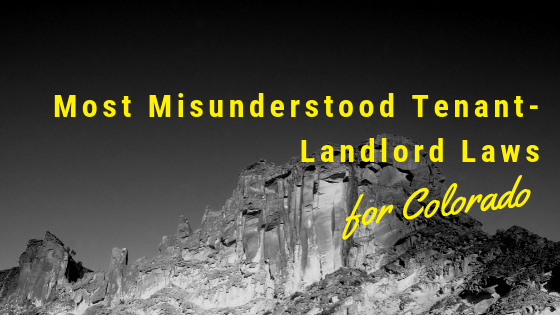Most Commonly Misunderstood Tenant-Landlord Laws
When you take on the responsibilities of being a landlord, there are a number of areas that you need to become familiar with in order to improve the likelihood of having a great tenant-landlord relationship. One topic that should be a cornerstone for your landlord practice is the various laws that help to provide both you and your tenant with legal protections. Here are some of the most commonly misunderstood tenant-landlord laws for the state of Colorado.

Security Deposit
It is not uncommon for landlords to charge a deposit that is equal to the monthly rent. However, there is no legal limit for the amount landlords are able to charge for a security deposit. Make sure that the amount you decide to charge for a security deposit is appropriate for your property so that any damages that may be present when the tenant has vacated the premises can be covered. Although there may not be a law when it comes to the amount, the deposit must be refunded to the tenant within a 30-day period of the date in which the lease was terminated. However, according to Colorado law, you can specify a longer amount of time in your lease, as long as the funds are returned to the tenant within a 60-day window. Any extension past the 60-day window is in violation of the Colorado rental laws.
Lease Terms
You may have signed a number of legal agreements in your life, but have you really read what is printed on such documents? Digesting legal terms on a lease can be challenging for all parties involved. However, as a landlord, it is your responsibility to ensure that the information contained in your lease is in line with both local and federal laws and regulations. It is also recommended to consult the laws regarding leases, as some landlords may include unenforceable clauses, which are not able to be enforced by the legal system.
Eviction
The early termination of a lease can be a headache inducing process. However, in Colorado, landlords often have the law on their side. According to The Coloradoan, Colorado ranks #7 when it comes to the renters’ rights, making the eviction process easier for landlords. When it comes to the reasons for evicting a tenant, landlords in Colorado can start the process after three days of nonpayment or if there is a violation in the lease.
Advance Notice
There are often times where a landlord will need to gain access to their tenant occupied dwelling to make repairs. This is another area where it can vary depending on the state in which the property is located. In Colorado, there is no state law criteria that pertains to the amount of advance notice that a landlord is required to provide prior to gaining entry, whereas other states require anywhere between 12 and 48 hours.
Habitable Premises Laws
As a landlord, there are a set of regulations that landlords need to abide by in regards to ensuring that the rental property they own is safe for their tenants. The Colorado Revised Statutes
- 38-12-503 outlines a number of conditions, which, if present, would result in a breach of the Warranty of Habitability on the part of the landlord. For instance, if there is a substantial lack of waterproofing of the roof and exterior walls, it can void the lease, allowing your tenant to terminate the lease prematurely, among other steps that can be taken by the tenant and legal system.
Conclusion
So there you have it! There’s no wonder there’s so many misconceptions floating around about landlord-tenant laws – there are a lot of them, they’re always changing and they’re confusing. If you’re in the Durango area, hiring The Property Manager will guarantee you have a knowledgeable person in your corner and someone who can help you avoid most of these conflicts. Call us anytime to get our advice at (970) 259-0222.
Legal Disclaimer
The information contained in this article is meant for general informative use only and may not reflect the laws of your state. No information in this article should be taken as legal advice, nor is it intended as a substitute for consulting real estate legal representatives. Please consult your local laws and statutes as they apply to tenant-landlord laws.



